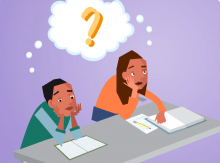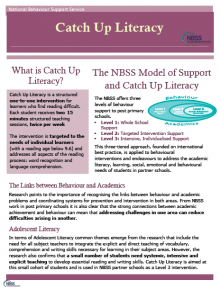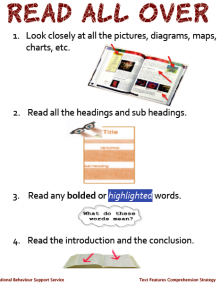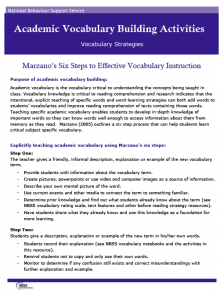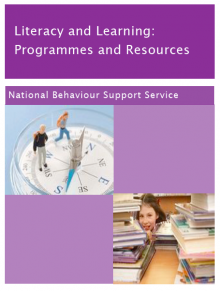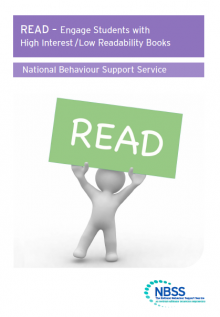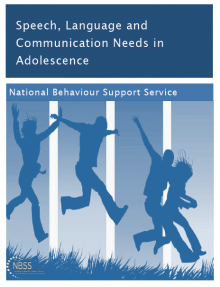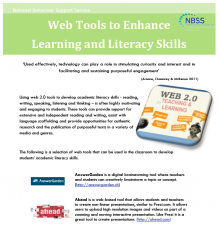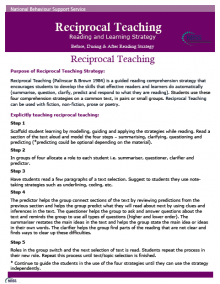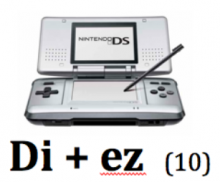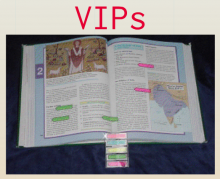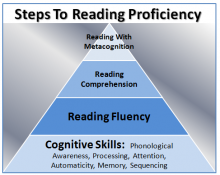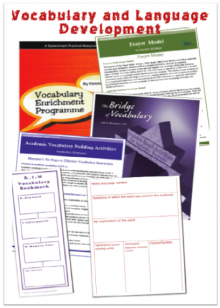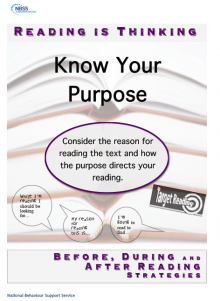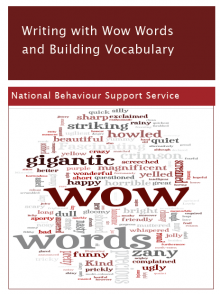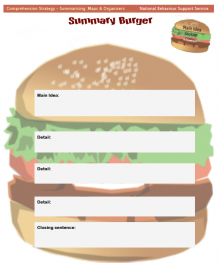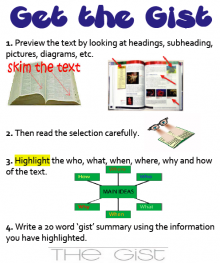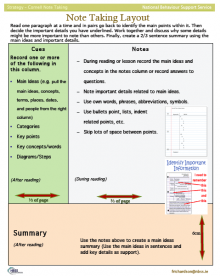At Level 3 the NBSS works with schools developing focused and individualised interventions for small groups of students or one-to-one support. This could involve explicitly teaching key reading and learning skills that enable students to become more purposeful, active readers and engaged, independent thinkers and learners.
Key Reading and Learning Skills:
- Making Connections
- Questioning
- Visualising
- Inferring & Predicating
- Determining Importance
- Summarising & Synthesising
- Monitoring & Clarifying Comprehension
Effective Practices to Support Adolescent Literacy
- The direct and comprehension strategies
- Explicitly teaching vocabulary
- Explicitly teaching writing strategies
- Providing opportunities for extended discussion of text meaning and interpretation
- Increasing student motivation and engagement in literacy learning
- Making available intensive and individualised interventions for struggling readers.
Examples of interventions, programmes and resources implemented in NBSS partner schools to support the development of key literacy, language and learning skills are outlined in the 'Language & Literacy Interventions, Programmes and Resources' section below.
Language & Literacy Interventions,
Programmes and Resources
Research points to the importance of recognising the links between behaviour and academic problems and coordinating systems for prevention and intervention in both areas.
NBSS research has also pointed to the association between failure with reading and behaviour difficulties. For example, an exploration of the reading ages of students (N=2187) receiving NBSS Level 3 behavioural support from the Spring Term 2009 to the Spring Term 2012 revealed that 66.3% (N=1450) of students were reading three or more years below their chronological age. Additionally, 4.3% (N=96) of the students receiving NBSS Level 3 support had reading ages of 7 years or less.
The negative effect of poor reading skills are well documented and wide ranging, for example poor academic achievement, low self-esteem, lower motivation to read, disengagement with learning and school, and behavioural problems.
From NBSS work in post-primary schools it is clear that the strong connections between academic achievement and behaviour can mean that addressing challenges in one area can reduce difficulties arising in another.
Essential Components of Reading
Research shows that there are five essential components of reading:
- PHONEMIC AWARENESS- The knowledge and manipulation of sounds in spoken words.
- PHONICS -The relationship between written and spoken letters and sounds.
- FLUENCY, INCLUDING ORAL READING SKILLS -The ability to read with accuracy and with appropriate rate and expression.
- VOCABULARY - The knowledge of words, their definitions and context.
- COMPREHENSION -The understanding of meaning in text.
'Reading is a complex process involving a network of cognitive actions that work together to construct meaning.' (Baker & Brown, 1984)
Common themes also emerge from the research literature on the essential components of effective reading instruction for adolescent learners. Among these is the need for:
- All subject teachers to integrate the explicit and direct teaching of vocabulary, comprehension and writing skills necessary for learning in their subject area.
- The need to develop and improve the fluency skills of some students.
- The need for systemic, intensive and explicit teaching related to phonics and phonemic awareness for a small number of students.
As part of its Model of Support, the NBSS works with schools in developing and implementing specific interventions, strategies and approaches that address the essential areas of reading for adolescent learners: Comprehension; Vocabulary; Fluency; Phonics and Phonemic Awareness.
However , the diversity of student needs, learning style, teaching style and classroom conditions that exist in any school means that no one ‘right’ strategy or programme holds the answer to addressing literacy difficulties. But using evidence-based programmes as ONE element of targeted support can play an important role in a school’s repertoire of prevention and intervention supports for students. Among the many interventions, programmes and resources used in NBSS partner schools to support the development of key literacy, language and learning skills are:
- Catch Up Literacy,
- Catch Up Numeracy,
- Digital Games,
- Wordshark,
- Numbershark,
- Numeracy Workout,
- Rapid Plus,
- High Interest/Low Readability Books (see NBSS READ resource),
- Toe by Toe,
- SRA Corrective Reading,
- SRA Reading Laboratory,
- AcceleRead AcceleWrite,
- The Wordsworth Programme,
- Trugs,
- The Vocabulary Enrichment Programme,
- Bridge to Vocabulary Programme,
- NBSS Vocabulary Resources,
- Flip for Comprehension,
- Comprehension Board Games,
- Reading Comprehension Cards,
- Spotlight on Reading & Listening Comprehension,
- Spell Write Right Programme,
- Storymaker's Chest,
- Story Cubes,
- SNIP Literacy Programme,
- Yes We Can Read (phonics)
- NBSS comprehension strategy, study strategy and learning strategy resources.
Literacy practices and interventions are more effective when data that indicates individual student needs is used to plan and monitor support.
Speech, Langugae and
Communication Needs
Language is fundamental to participation in school life (academic and social). At post-primary level the language demands of the classroom increase significantly. The NBSS Speech and Language Therapist (SLT) works with targeted partner schools providing assessment, diagnosis, intervention and management of speech, language and communication needs, where appropriate.
Between 50-80% of young people with social, emotional and behavioural difficulties have undetected speech, language or communication needs (Bryan et al., 2007; Snow & Powell, 2008). Speech and Language Therapy assessment of 40 students in five NBSS partner schools found that 95% of the students assessed presented with a speech and language difficulty. Of the 95%, 70% presented with a severe difficulty in at least one area of language (receptive or expressive language) while 60% presented with a severe difficulty in both receptive and expressive language skills. 92% presented with difficulty in at least one area of literacy (reading comprehension, phonological literacy or spelling). Vocabulary understanding and use was an area of difficulty for 88% of the students. In school these students will have difficulty expressing themselves, understanding what the teacher says and interacting appropriately with peers and adults.Without appropriate intervention and support young people with SLCN may struggle significantly to develop adequate language skills in adolescence.
The NBSS Speech and Language Therapist works to develop and maximise students’ speech, language and communication needs as well as their learning and socialisation skills. The SLT works collaboratively with school staff in targeted schools to provide appropriate intervention and support to address these needs and develop these skills. For example, the focus of an intervention could be on developing a student’s vocabulary; reading and understanding of stories, instructions, questions and books; telling and writing stories and answering questions; or developing a young person’s social skills e.g. eye contact, conversation skills.
Teacher as Researcher Projects:
Level 3 Intervention Example
As part of the 'Teacher as Researcher' Projects the NBSS works with teachers on literacy, learning and study skills research projects across Senior and Junior Cycle. Teacher as Researcher Projects can be developed at all three NBSS levels of support and tailored to the needs of each school or student group.
The following is an example of a 'Teacher as Researcher' project focused on developing students' literacy and writing skills using strategies from the NBSS 'Writing with Wow Words and Building Vocabulary' resource. The students were accessing support in the school's Behaviour Support Classroom.
"...their reports at Christmas were that they weren’t working anywhere near to where they should be. So motivation is a huge issue for them. They are not motivated. They just do the bare minimum and that is it. And all of their teachers indicate that on their Learning Behaviour Checklist...
Well I took the WOW words (NBSS resource)… So we had the story planners and then they picked two titles to come up with the why, what and where for two of those stories. Then they would fill out a more detailed plan…start to really fill in what is happening, where is it happening, why is it happening and when is it happening. …computers really worked for them. So they did a first draft on the computer and initially they would have done one paragraph unfinished and so we would go back to the plan and I would say you haven’t talked about this and you haven’t talked about that. So they kept going and put a little more in it. And then they started to read each others quite early on. And I wasn’t sure because they can be quite harsh on each other... And they were very complimentary. They would be saying, 'that is a deadly story' or 'that is cool'. So they were interested in where each others’ stories were going to go. It was kind of an extraordinary moment for me …
...I thought I would be looking at three lessons max and suddenly it became a good week’s worth of work. The importance of getting some pictures in at the end, getting the print right, the presentation was very important to them. And these are guys that…if you look at their copies they are all over the place. And laminating them. All of these things were very important. And they were very proud putting them up on the wall. It was very interesting. And I said that I would show them to their English teacher and they were very keen that their English teacher saw it…and the English teacher was surprised at the work they had produced."
NBSS Literacy and Learning
to Learn Resources
The NBSS teacher and student resources support the development of academic literacy, learning and study skills at Senior and Junior Cycle. On the Publications & Resources section of this site there are learning, reading comprehension, vocabulary, writing and study strategy resources available to download, as well as vocabulary notebooks, reading and learning bookmarks and posters.
Also check out our 'Links' page.

